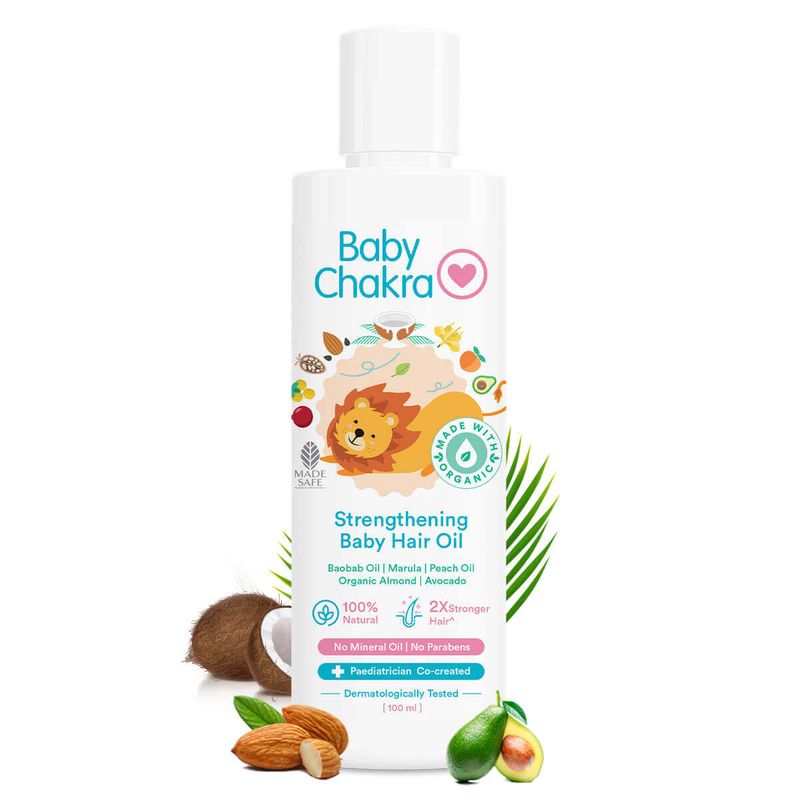
9 Benefits Of Baobab Oil For Your Baby’s Hair
19 May 2022 | 4 min Read
Sayani Basu
Author | 607 Articles
As parents we want to give our children nothing but the best. Especially when it comes to their health, skin care and hair care. A good hair oil for the baby is as important as any other nourishment we want to provide them.
Choosing the right hair oil for babies can be a task, as there is a wide array of choice. A good hair oil will give the baby’s scalp the nourishment it needs for a healthy and strong hair growth.
It also moisturises the scalp and combats dandruff. Therefore, oiling your baby’s scalp with the right hair oil is a requisite for the baby’s hair growth..
A hair oil with the goodness of baobab oil, moisturises and strengthens the hair strands. It is an oil that works wonders for both your skin and hair. The high omega-3 unsaturated fat in baobab oil is the perfect therapy for your little one’s scalp. Here are some of the benefits of baobab oil for your baby’s hair. Take a look!
What Is Baobab Oil?
Also known as the baobab seed oil, baobab oil is native to Africa. Its scientific name is the Adansonia digitata and has a plethora of benefits.
After its extraction from the fruit, the oil is yellowish to gold in colour and has a light nutty smell.
If you put some drops of baobab oil on your hands, you would notice that it has a silky and smooth feel. It gets easily absorbed into the skin and does not feel like oil.
Baobab oil contains Omega 3, Omega 6 and Omega 9 and is rich in exotic fatty acids that are absent in other oils.
These fatty acids are Dihydrosterculic acid, Sterculic acid, Malvalic acid, Linoleic acid, Palmitic acid, Arachidic acid, Oleic acid, Stearic acid, Vitamin A, Vitamin E, Vitamin D, and Vitamin K.
9 Benefits of Baobab Oil for Your Baby’s Hair
Your baby’s hair and scalp are prone to breakage and dryness. This is one of the best oils to use on babies, as it strengthens the little one’s weak hair. This natural oil will also smoothen the hair cuticles.
Baobab oil conditions your little one’s hair. Your baby’s hair needs moisture to grow and baobab oil’s potent moisturising properties does wonders.
Depending on your baby’s hair texture, baobab oil can be massaged from root to tip. You can also add a few drops of baobab oil to your baby’s conditioner to boost its nourishing power.
Baobab oil moisturises the scalp. Besides conditioning your baby’s hair, baobab oil when massaged into the scalp keeps dryness and flakes at bay.
Rich in omega-3 fatty acid, baobab oil deeply moisturises your baby’s scalp and boosts the health of the little one’s hair.
Baobab oil prevents your baby’s delicate hair from climate changes. It battles against a wide range of allergens and germs.
Keeping your baby’s scalp saturated, baobab oil reduces dryness as well.
It also reduces hair fall and breakage so that your baby’s hair grows healthy. Using the baobab oil, your little one can also get rid of the sticky buildup and other airborne particles in his/ her hair.
Baobab oil encourages your baby’s hair growth. It reduces clogging of pores which reduces the amount of hairfall. It dissolves and clears the blockages in the pores which results in the development of fresh cells, encouraging the growth of hair.
Key Takeaways
The best part is that baobab oil is not only beneficial for your baby’s hair and skin, but also for you. The vitamin content of baobab oil helps to reduce stretch marks, heals chapped or cracked lips, improves hair texture, promotes hair growth and nourishes your skin deeply. So, get ready to pick up baobab oil today that has a list of benefits.
A


Suggestions offered by doctors on BabyChakra are of advisory nature i.e., for educational and informational purposes only. Content posted on, created for, or compiled by BabyChakra is not intended or designed to replace your doctor's independent judgment about any symptom, condition, or the appropriateness or risks of a procedure or treatment for a given person.

